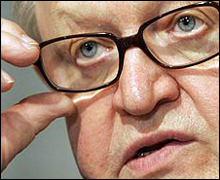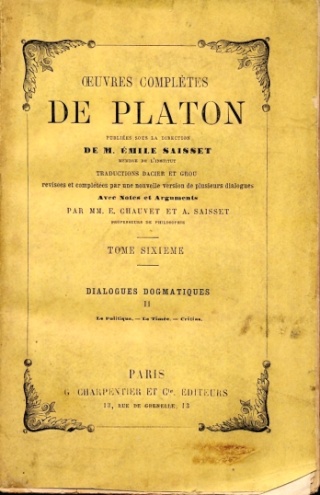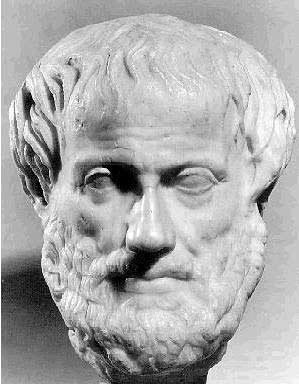Mais il y avait mieux, enfin, pire – un fossoyeur de nations. Un serviteur fidèle des plans de Washington. Sans surprise, c'est l'infâme Martti Ahtisaari qui aura été choisi. C'est pratique, le "prix nobel de la paix," ça aide à savoir qui il ne faut pas considérer comme respectable!
http://www.interfax.com/search.aspx?query=Ahtisaari
1. Duma deputy skeptical about awarding Nobel Peace Prize to Ahtisaari
Oct 10 2008 15:10 GMT Topic: Russia & CIS
2. Finland's Martti Ahtisaari wins 2008 Nobel Peace Prize
Oct 10 2008 09:17 GMT Topic: Russia & CIS
http://www.lefigaro.fr/flash-actu/2008/10/10/01011-20081010FILWWW00461-russie-le-prix-nobel-de-la-paix-mal-acueilli.php
Source : AFP
10/10/2008 | Mise à jour : 15:54
L'attribution du prix Nobel de la paix à l'ex-envoyé spécial de l'ONU au Kosovo, le Finlandais Martti Ahtisaari, a été vivement critiquée aujourd'hui en Russie, où il est accusé d'avoir contribué à la "scission de la Serbie".
"Cela ne m'inspire rien d'autre que des gros mots", a affirmé à la radio Echo de Moscou l'ambassadeur russe auprès de l'Otan Dmitri Rogozine.
"Pourquoi attribuer le prix Nobel et d'autres distinctions à Ahtisaari, je n'en ai aucune idée. En réalité, il est l'auteur d'une série d'actions qui visaient à déformer et violer le droit international et les décisions du Conseil de sécurité de l'ONU", a-t-il ajouté, cité par l'agence Interfax.
Le chef de la commission des Affaires étrangères du Conseil de la Fédération (chambre haute du Parlement russe), Mikhaïl Marguelov, a déclaré quant à lui que l'attribution du prix Nobel à M. Ahtisaari laissait "un arrière-goût".
L'ancien président finlandais a travaillé au règlement de conflits régionaux "pendant 30 ans" et "l'attribution du prix n'aurait pas laissé un arrière-goût s'il n'avait échoué dans sa mission au Kosovo", a estimé M. Marguelov, cité par Interfax.
"Reste à espérer que la longue liste des mérites de l'ex-président finlandais ait dépassé cet échec regrettable, bien que cet échec soit ni plus ni moins que la scission de la Serbie", a-t-il ajouté.
"Il n'y avait pas de candidature plus indigne", a affirmé pour sa part un ancien haut responsable du ministère russe de la Défense, le général Léonid Ivachov, cité par l'agence Ria Novosti.
"Sa contribution à la guerre et à la destruction des Etats, en particulier dans les Balkans, est plus importante que ses efforts pour la paix", a estimé ce général qui dirige l'Académie des problèmes géopolitiques.
http://www.russiatoday.com/features/news/31699

Martti Ahtisaari
October 10, 2008, 22:24
The Nobel Prize Committee has sparked controversy by selecting former Finnish president Martti Oiva Kalevi Ahtisaari as this year’s Peace Prize winner. He is best known as the author of the proposal to settle the conflict in Serbia’s breakaway Kosovo region.
The committee cited Ahtisaari’s “important efforts, on several continents and over more than three decades, to resolve international conflicts.”
He was one of 197 nominees, but his choice has elicited a mixed reaction in Russia, with suspicions voiced that the decision was “politicised.”
Ahtisaari was a teacher before entering the foreign service. His first posting was as Finnish ambassador to Tanzania in 1973, when he was 36.
He was instrumental in the Namibian independence movement as a UN special envoy in the 1980s and he went on to become president of his country from 1994 to 2000.
In 2005, he took part in the peace process in Aceh, Indonesia, helping to bring an end to a three-decade conflict there. Ahtisaari also had a hand in peace efforts in Northern Ireland and the horn of Africa.
But it is his role in Kosovo which has thrust him into the spotlight most recently. Kosovo, which has a large Albanian population, had been under the administration of KFOR, a NATO-led peacekeeping force, since the NATO military operation in 1999. It had forced Serbian president Slobodan Milosevic to agree to a foreign military presence there in light of accusations of genocide of the Albanians.
The region remained troubled and Ahtisaari was appointed UN special envoy in November 2005 to search for a settlement. His complex proposal was widely interpreted as giving statehood status to the region, as it allowed it its own national symbols, security force and the right to apply for membership of international organisations.
While the plan received wide support from Western powers, Serbia and Russia were vehemently opposed to it. Ultimately, the European Union, Russia and the United States agreed to find a new format for negotiations, and Ahtisaari declared his mission over. Kosovo unilaterally declared its independence in February of this year.
The Nobel Prize has triggered criticism in Russia. Chairman of the Federation Council Foreign Affairs Committee, Mikhail Margelov, said: “If it weren’t for the UN mission in Kosovo, which, no matter what you say, Ahtisaari did not carry out, the awarding of the prize would not cause any fallout. We can only think that, for the Nobel Committee, the impressive list of the accomplishments of the former president of Finland outweighed that misfortune, even though that misfortune is nothing less than the division of Serbia.”
Konstantin Kosachev, chairman of the Russian State Duma Foreign Affairs Committee, suggested that the award “is an attempt to give the so-called Ahtisaari plan for Kosovo, which did not solve the problem, a retrospective certification of quality.”
A number of other Russian politicians commented in a similar vein. First deputy chairman of the same committee called Ahtisaari’s award justification for the recognition of Kosovo, which had “opened Pandora’s box” for unrecognised republics.
Alexander Torshin, deputy speaker of the Federation Council, shared Slutsky’s point of view, but gave it a different interpretation. “The Nobel Committee’s decision on Ahtisaari is the perfect proof that Russia’s recognition of the independence of South Ossetia and Abkhazia is justified. Mr Ahtisaari’s role in the division of Serbia and independence of Kosovo is widely known. Thus Russia’s actions in relation to Abkhazia and South Ossetia have practically received acknowledgment from the whole Nobel Committee.”





Aucun commentaire:
Enregistrer un commentaire